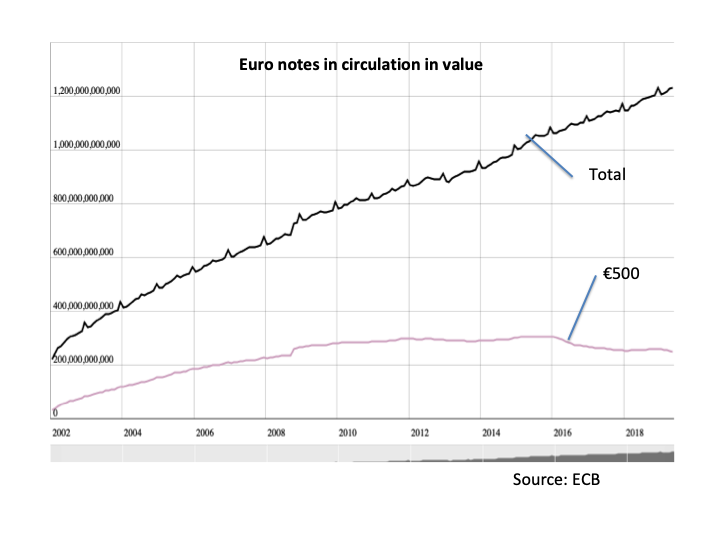Dutch government to limit cash payments
According to the Dutch press, the Dutch Finance Minister and Justice and Security Minister are putting forward a package of measures to Parliament, aimed at fighting against money launderingThe operation of attempting to disguise a set of fraudulently or criminally obtained funds as legal, in operations undeclared to tax authorities, and therefore not subjected to taxation. Money laundering activities are strongly pursued by authorities and in most countries, there are strict rules for credit institutions to cooperate in the fight against money laundering operations, to declare and report any transactions that could be considered suspicious. More. Two of their measures specifically target cashMoney in physical form such as banknotes and coins. More.
The first measure would impose a €3,000 limit on cash payments.
Currently, 16 EU members states have imposed cash paymentA transfer of funds which discharges an obligation on the part of a payer vis-à-vis a payee. More limitations, which range from €500 in Greece to approximately €14,000 in Poland. The Netherlands have a declaration obligation which varies according to the type of retailer: e.g. €2,00 for moneyFrom the Latin word moneta, nickname that was given by Romans to the goddess Juno because there was a minting workshop next to her temple. Money is any item that is generally accepted as payment for goods and services and repayment of debts, such as taxes, in a particular region, country or socio-economic context. Its onset dates back to the origins of humanity and its physical representation has taken on very varied forms until the appearance of metal coins. The banknote, a typical representati... More transfers of €25,000 for car dealers.
In June 2018, the European Commission published a report on the impacts of restrictions on payments in cash. This report is the result of a 2-year consultation on the issue, which included a public consultation as well as the commissioning of an impact study to an external contractor. The report concludes that:
- Limiting the use of cash would not prevent terrorism financing
- Europeans would consider any EU-level restrictions as a breach of their personal freedom (94.94% respondents said so)
- The heterogeneous nature of current restrictions at the national level have a negative impact on the internal market
- Restrictions could eventually be useful in combatting money laundering, although “the impact of a cash restriction on money laundering in general, cannot be precisely quantified”
The second measure calls for the €500 to be withdrawn from circulation.
This may prove more challenging to implement.
In May 2016, the ECB announced it would cease production and issuance of the banknoteA banknote (or ‘bill’ as it is often referred to in the US) is a type of negotiable promissory note, issued by a bank or other licensed authority, payable to the bearer on demand. More. The issuing continued until 27 January 2019 for 17 central banks of the euroThe name of the European single currency adopted by the European Council at the meeting held in Madrid on 15-16 December 1995. See ECU. More area and 26 April 2019 for the Deutsche Bundesbank and the Oesterreichische Nationalbank. However , as stated on the ECB’s website “Existing €500 banknotes will continue to be legal tenderMoney that is legally valid for the payment of debts and must be accepted for that purpose when offered. Each jurisdiction determines what is legal tender, but essentially it is anything which when offered (“tendered”) in payment of a debt extinguishes the debt. There is no obligation on the creditor to accept the tendered payment, but the act of tendering the payment in legal tender discharges the debt. More, so you can still use them as a means of payment and store of valueOne of the functions of money or more generally of any asset that can be saved and exchanged at a later time without loss of its purchasing power. See also Precautionary Holdings. More (i.e. spend and save them). Similarly, banks, bureaux de changeThis is the action by which certain banknotes and/or coins are exchanged for the same amount in banknotes/coins of a different face value, or unit value. See Exchange. More and other commercial parties can keep recirculating the existing €500 notes. Like all denominations of euro banknotes, the €500 note will always retain its value and can be exchanged at a national central bank of the euro area at any time.»
According to the Treaty on the Functioning of the European Union – the Maastricht Treaty – only the euro has the status of legal tender within the euro area. Article 128 of the Treaty reads
“The European Central Bank shall have the exclusive right to authorise the issue of euro banknotes within the Union. The European Central Bank and the national central banksIn general, the expression refers to the central banks of different countries. More may issue such notes. The banknotes issued by the European Central Bank and the national central banks shall be the only such notes to have the status on the scope and effectsof legal tender within the Union.”
In May 2019, there were just under 500 million €500 notes in circulation representing a total value of €248 billion.
While legal tender does not automatically mean that the note should be accepted in all circumstances, and the interpretation of legal tender differs across countries, the European Commission has issued a recommendation on the scope of effects of legal tender of euro cash. The third guideline of the recommendations states that it should be the rule to accept high denominationEach individual value in a series of banknotes or coins. More notes.
Other measures included in the package consist in increasing the capacity of the Dutch money laundering authority and encouraging banks to share information on suspicious clients.
